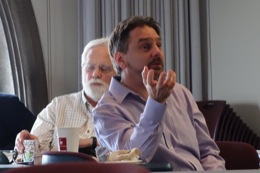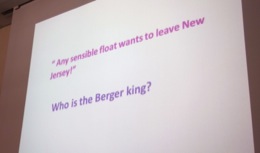

![]()
home
::: about
::: news
::: links
::: giving
::: contact
![]()
events
::: calendar
::: lunchtime
::: annual
lecture series
::: conferences
![]()
people
::: visiting fellows
::: postdoc fellows
::: resident fellows
::: associates
![]()
joining
::: visiting fellowships
::: postdoc fellowships
::: senior fellowships
::: resident fellowships
::: associateships
![]()
being here
::: visiting
::: the last donut
::: photo album
|
|
Bolder
Allan Franklin, Lunchtime talk, March 31, 2015
Allan Franklin was our Senior Visiting Fellow last year. One might expect a full year in the Center enough for anyone. But not Allan. He is back visiting again, for a month or so, this time in the Department of HPS.
Today he will give a talk in the Center. Allan’s decades of work and ten books on the topic have made him the central figure in philosophy of scientific experiment. His talk is on experiment. “Can a Good Experiment Fail?” he will ask, and perhaps answer.
My problem is to make an appropriate introduction. The challenge is always the same. A good introduction makes the speaker feel honored and welcomed, yet it does not bore the audience. They should be warmed to the speaker and, if possible, amused a little.
Allan loves puns. They are not my favorite form of wit. Last year, to stem the flood, we had rationed him. He needed to earn his puns as credits in a pun bank. For this talk, Allan warned me, he still had one credit and he planned to use it.
That settled it. I knew what I had to do to introduce him. My plan had been to have someone sitting close to the front to photograph me speaking. For once, I’d have a photo of me for these pages. But there was no one sitting close enough. In the moments before introducing Allan, I produced this “selfie.”
I was immediately informed by the rest of the room that I needed a “selfie stick.” On a second try, I got myself in focus, but missed Allan.
The introduction began with a brief biographical recitation. Allan was an experimental particle physicist. Then decades ago he migrated to history and philosophy of science.
“But that is not a proper introduction,” I continued.
“I still recall years ago, in 1986, when I first met Allan. It was in this hallway right here in the Center.”
“So, you are from Colorado,” I said to him.
“Boulder,” he replied.
“OK,” I said, “SO, YOU ARE FROM COLORADO . . . “ I continued, obediently.
“Let’s have lunch,” Allan replied. “I’d like a physicists’ lunch: fission chips!”
“I know just the place to go,” he continued, “but we’ll have to say we are neutrons and then there’ll be . . .”
At this point I gestured to Allan and handed over to him, confident that he could complete the line. It’s an ancient physics pun:
“. . . no charge.”
Alas, he was blind-sided and the completion did not come until someone shouted it out. Then Allan bounced back with the now celebrated:
“A faster-than-light neutrino walks into a bar. . . “

You’ll likely want a little more elaboration. The slogan is that a failed experiment that is methodologically good is still a good experiment. I wanted to blurt out, “well, it all depends on what you mean by good. . .” but I held my tongue.
It reminded me of the standard practice in grading undergraduates taking quantitative classes. If they use the right method of calculation, but get the wrong number because of some slip, then they still get most of the credit for doing the right calculation. It seems kind and even fair.
It was a little shock when, as a chemical engineering student, I discovered that not everyone sees it that way. In engineering, getting the right answer is really all that matters. If the correct calculation calls for a 4” pipe and you make a small slip at the end of your sums and specify a 40” pipe, the construction engineers and the plant operators will be quite disinclined to give you even partial credit for doing the right calculation. They care not one whit for your self-esteem.
While all this unfolded, I was waiting for the promised pun. It emerged in the context of experiments dedicated to finding the so-called “fifth force.” Two experimenters vied over the experiments. Thieberger found a positive result. Adelberger found a negative result.
This led to the question: “Who is the Berger king?”
John D. Norton






